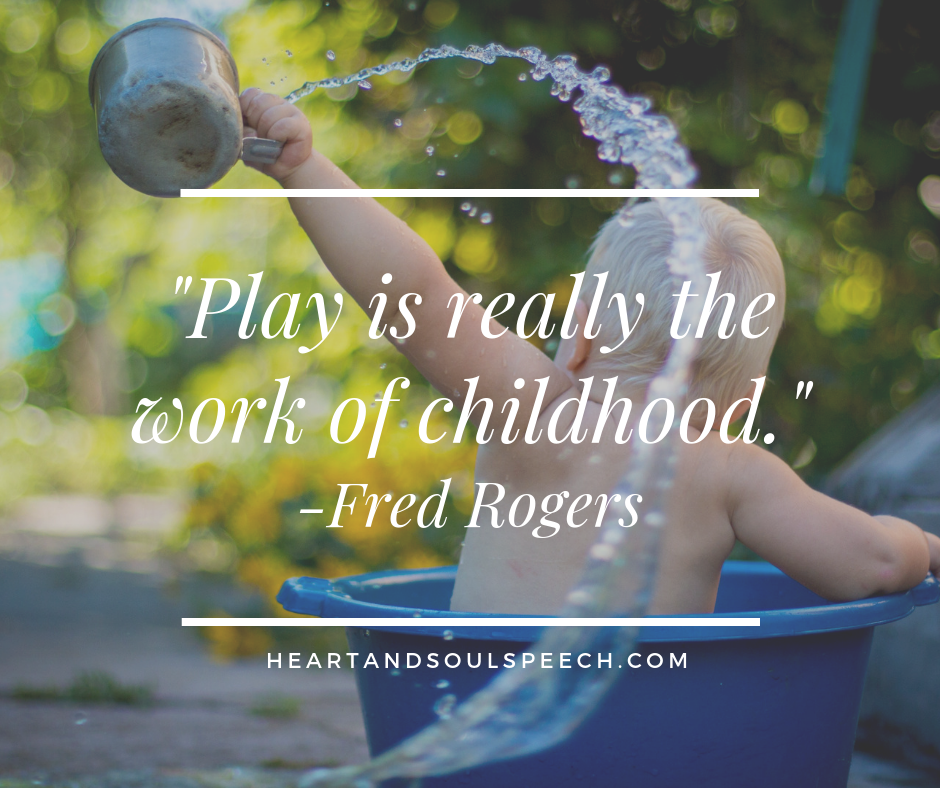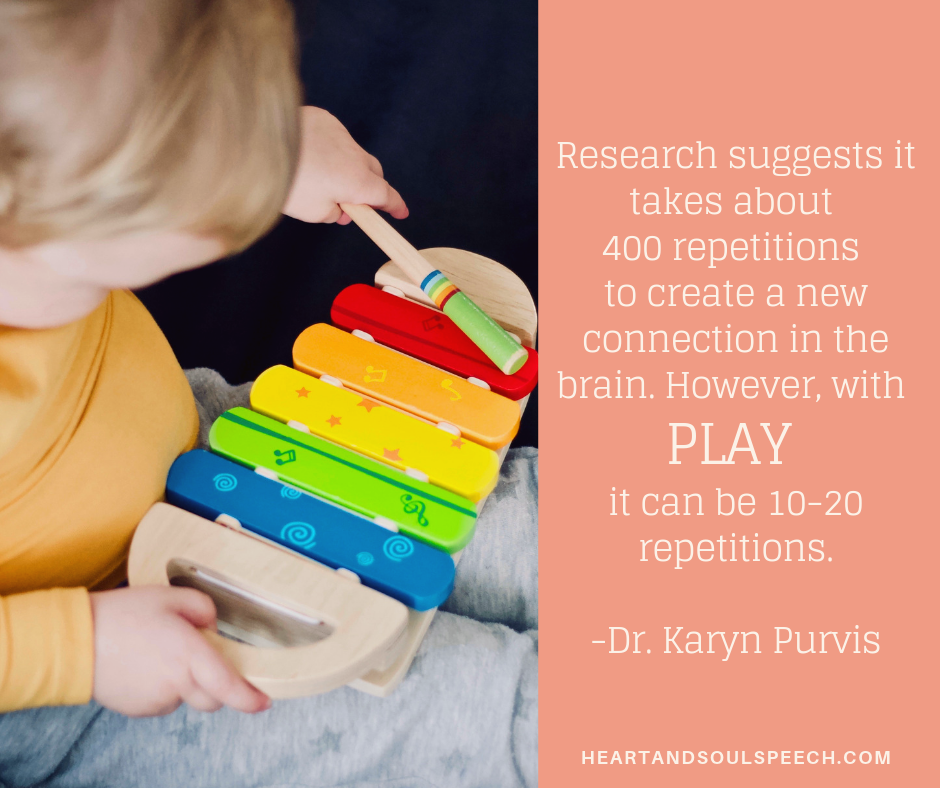As a pediatric speech-language pathologist, I’ve been asked by other parents in therapy “When will he talk? All you do is play!” I’m pretty sure my husband thinks I only make playdough creations and play Go Fish. Actually, he’s not wrong – I do A LOT of play in my job, but purposeful play is hard work and how children learn.

“Play is often talked about as if it were a relief from serious learning. But for children play is serious learning. Play is really the work of childhood.” Fred Rogers
What is Purposeful Play?
Lisa Sunbury from Regarding Baby defines play as “the way children learn about themselves, the people around them, the world they live in, and how things work in their world. [However,] play is not done to attain any reward or end goal.” Play alone is motivating enough to keep learning and exploring. Play doesn’t have to be extravagant, planned, loud, or even with “toys.” Play can be had with literally anything –tickling tiny toes, hide and seek in cardboard boxes, signing silly songs, pouring water through a funnel, or blowing a leaf on the sidewalk.
Why is play so important?
Play is an important part of a child’s physical, emotional, intellectual, and social language development. Before young children use words to tell us what they know, they show us through their play. A baby finds cooing way more fun when playing peek-a-boo than just lying alone. Play encourages them to explore, experiment, and change their environment to learn new skills.
However, in order to communicate effectively with others, a child must first be interested in others. Play teaches eye contact, imitation of movement and sounds, turn-taking, anticipation, nonverbal cues, gestures, understanding, and much more. Does the child look to mom when the blocks fall down to check her response? Does the child follow dad’s point to look at the pictures in the books?
Cognitive skills, which include problem-solving, planning, attention, turn-taking, and cause-effect, set the foundation for understanding words and using words. Play fosters imagination and creativity, as well as perspective-taking and emotional regulation. Play builds confidence and can help make associations with real world events.
 Research implies it takes about 400 repetitions to create a new connection in the brain – unless it is done with play, in which case, it takes between 10-20 repetitions. Dr. Karyn Purvis
Research implies it takes about 400 repetitions to create a new connection in the brain – unless it is done with play, in which case, it takes between 10-20 repetitions. Dr. Karyn Purvis
How does play help speech and language develop?
- Children watch and learn to imitate others’ actions. As soon as a baby is born, they are watching your face, learning about communication through your expressions and body language.
- Even before babies are born, they are listening to the sounds we make, the words we use, and the sentences we build. When we talk with them, children learn to match what they hear to what they see.
- Children explore and learn through play. When you stack the blocks, they are learning new words and concepts like “block, on top, uh oh!”
- Children start experimenting with what they see and hear. The first baby coo is the sweetest sound and first step to language! Clapping, waving, and pointing are also precursors to language.
- Purposeful play creates purposeful language. Through play, a child learns to communicate his wants and needs and share information.
“Play is Enough” —Janet Lansbury
Kids these days are busy. Our society pressures caregivers to “enrich” their child’s development with a million extracurricular activities every hour of the day. Why do I feel so guilty if I skip out on the Mom & Me music class when my toddler has no interest and is happier banging on pots and pans?
If you’re running ragged taxiing your children around to their classes and activities, listen up! You don’t have to fill your child’s schedule to keep up. Children can keep themselves busy without much help. Purposeful play is not directed by an adult or testing through questions and directions. It does not pressure the child to perform for us. There is no “right” way to play. Creating, exploring, imagining – Purposeful play on it’s own is enough.
How can I create purposeful play for my child?
- Create time for unstructured, child-directed open play
- Allow a “yes” space for the child to have freedom to explore their environment.
- Remove your expectations and follow their lead. Tune in to your child’s interests.
- Ask open-ended questions instead of yes/no questions or “testing” questions. For example, instead of asking “Which block is yellow?” you could say “Wow, your tower is tall! I wonder what will happen when you put the last block on top?”
How do your kids purposefully play? What have they learned through playing?
This is Part 1 of our Play Series. You can find the others here: You can find the others here: Part 2: Stages of Play Development Part 3: Independent Play and Part 4: Pretend Play

5 Responses